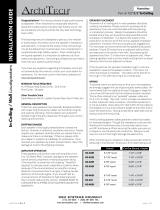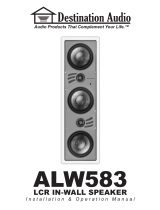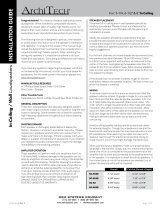Page is loading ...

Angstrom Loudspeakers MC
391 Marwood Drive, Unit 6, Oshawa, ON L1H 7P8 • TEL: 416-988-8806
www.angstromloudspeakers.com
You have purchased a high quality stereo
loudspeaker. When matched to comparable electronic equipment,
expect years of quality high delity sound. Our belief is that music
matters and we are focused on delivering superlative music
reproduction everywhere in your home.
The following manual is designed to give you, the installer or owner,
basic information as to the speaker’s installation and operation.
It is beyond the scope of this manual to go into all the details that
must be taken into consideration in a sophisticated high delity
system. When installing the wiring and speakers it is important to
adhere to all local codes and regulations. Consulting a professional
will help to maximize your system’s performance.
If you have any questions that are not answered by this manual,
contact your local dealer for assistance. For the most current
information please visit: www.preference-audio.com.
Each speaker is thoroughly tested before it leaves the factory.
However, in shipment, accidents may occur. Please inspect your
speakers carefully when you receive them to make sure there
is no damage. If there is, please notify your dealer, or supplier
immediately for assistance. If you received your speakers by public
transportation, report the damage at once to the shipping company.
These speakers will perform well with ampliers from 5 to 125
Watts RMS. However, damage to the speakers can be done by
ampliers of nearly any power rating if the amplier is overdriven
into clipping. “Amplier clipping” is a phrase used to describe
a condition when, because of the volume demand, an amplier
is being asked for more power than it can give. Clipping causes
distortion of the audio signal. If you should hear an unusual
amount of distortion at high listening levels then consider reducing
the volume. DAMAGE DONE TO A SPEAKER BY CLIPPING IS NOT
COVERED UNDER THE WARRANTY.
This speaker was designed and engineered to provide the nest
performance achievable in a compact package. The custom
waveguide is unique in the industry and provides cross-axis
performance that gives every listener in the room a sense of
envelopment unmatched by other speakers in this category.
By focusing the sound eld across the listening space, the
listener experiences a more balanced and symmetric sound level,
especially when the main speakers are spaced more closely than is
ideal, (common in many of today’s home theaters).
The waveguide also increases the efciency of the tweeter,
allowing it to operate with far less input power and signicantly
lowering the distortion. This same waveguide also allows the
tweeter to operate a full octave lower than conventional dome
tweeters, This allows the tweeter to cover more of the critical voice
range.
This same cross-axis tweeter design creates a much smoother
off-axis listening experience, eliminating the midrange-hole that
is commonly experienced with conventional designs. Additionally,
by controlling the directivity of the sound eld, the early reections
that occur from nearby walls and furniture are reduced so that
more of the direct sound from the speakers are heard, improving
the intelligibility and detail of the original sound source.
Finally, the inset tweeter produces a time aligned position and
excellent phase coherency with the woofer, improving the off-axis
performance, both in the vertical and horizontal directions.
This speaker can be used for 2-channel High Resolution audio
or for nearly any speaker location within a home theater system.
The chart on the following page provides suggested tweeter
orientations for a number of common speaker locations within a
home theater. We encourage you to experiment with the tweeter
orientation to see what works best within your system, especially
with surround placements.
While it may seem unconventional to use this speaker in the
Landscape orientation for the center dialog speaker, it is actually
well suited because of the excellent phase coherency between the
tweeter and woofer. The speaker actually outperforms most of MTM
(Mid-Tweeter-Mid) designs that have become commonplace for the
center dialog channel.
• The tweeter should be rotated into the desired position for optimal
performance.
• There are detents every 15 degrees. The tweeter will lock into
these detents when positioned over them.
• Press rmly at the edge of the tweeter waveguide using 4 ngers.
• A gap of about 2mm will appear at the edge when depressed.
• Rotate the tweeter into the desired position, releasing when you
feel a detent.
• NOTE: It may be necessary to moisten one's ngers to achieve
good traction on the waveguide.
• The detents will not be felt when the waveguide is fully depressed.
Decrease pressure to locate the detents.
Rev.A page 1 of 4
Frameless
For: 6-1/2" In-Wall with Rotating Waveguide
Overall (W x H) Cut-Out (W x H x Depth)
INDF 6.5W 9"x15-3/4" 7-15/16"x14-7/16"x3-1/8"
AEF 6.5W 9"x15-3/4" 7-15/16"x14-7/16"x3-1/8"

Two holes have been
provided to lock the
tweeter into place and
prevent rotation.
Should it be desirable to
lock the tweeter, install
two #6x3/8" (3.5mm
X 10mm) sheet metal
screws with at washers
in the provided holes.
(Hardware not included)
page 2 of 4
Placement of In-wall speakers should be carefully considered.
Please contact a professional for assistance if you are
uncomfortable with the planning or installation process.
Ideally, the speakers should be located where they will provide
the best possible sound and ease of installation. It is beyond the
scope of this publication to discuss all of the various aspects of
speaker placement but here are some helpful suggestions.
For more bass, place the speakers between 18 and 36 inches
from an adjacent wall as measured to the center of the speaker.
Avoid placing the speakers less then 18 inches from an adjacent
wall. When placing speakers near a corner, avoid locating them an
equal distance from the two adjacent surfaces.
When used in a home theater the front left and right speakers
should be separated from each other a distance of 0.8 to 1.2
times the seating distance (assuming they are on the same
plane as the center speaker). For example, if the seating position
is 10 feet from the viewing screen and/or center speaker then
ideally the distance between the left and right speakers should
be somewhere between 8 and 12 feet, (10 x 1.2ft = 12ft). If the
speakers are located behind an acoustically transparent screen
then all the speakers should be oriented portrait style. The
tweeter should be aimed toward the listening area.
To achieve maximum performance we recommend that the
speaker cable be at least 16 gauge or larger for runs over 50 feet
(15m) and that the cable be double insulated. A CL-2 or CL-3 rated
cable may be required. Check local codes. “Zip cord,” which is
single insulated and is often made with clear insulation, should be
avoided as it is not as durable. Allow about 2½ feet (0.8m) of free
cable at the speaker cut-out and sufcient length at the other end

Rev.A page 3 of 4
to reach the electronics. Having to add extra cable later can be
tedious and time consuming.
Avoid bundling speaker cables parallel to electrical cables for
extended lengths. Though the impedance is low and the likelihood
of interference low, this may help reduce hum and RF interference.
When securing the cable, use care not to staple or nail through the
electrical conductors. Doing so could result in a short that might
damage the electronics.
When connecting your speakers, make sure proper polarity
(phasing) is maintained. Simply put, this means ensuring the
same wire which is connected to the positive terminal of the
amplier has its other end connected to the positive terminal of
the speaker. It is important to check this on all speakers. If the
connections on one of the speakers are reversed, (out of phase)
the sound quality will be impaired.
If the drywall has not yet been installed a Rough-in-Bracket (RIB-
LCR) may be used to reserve the speaker location on the wall.
The RIB-LCR brackets are available from the distributor or dealer
where the speakers were purchased. When these brackets are
used the holes are cut when the drywall is installed. The cable can
be tied off on the bracket after securing the cable to a nearby joist.
If the drywall is installed and the speaker locations have not yet
been established, then do so now. Assess the wall for possible
concealed obstructions such as wiring, plumbing, etc. Inspect the
backside of the wall, the attic, and/or the crawl space if available
for clues to possible obstructions. Use inspection holes with
inspection tools (camera, mirror, ashlight, etc.) if absolutely
necessary. Use a “stud nder” to locate the positions of the studs.
INDF 6.5W
Once the speaker locations are established use the cardboard
template (the outside of the inner cardboard rectangle) to mark
the speaker cut-out. The dimensions for the cut-out are listed
in the chart on the previous page. Using the proper tool, cut the
appropriate sized hole in the wall. On drywall, clean cuts can be
made with a drywall saw.
If the cable has not yet been run, do so now that you have access
to the wall’s interior.
To aid in speaker performance, a brous material, such as
berglass, may be placed behind the speaker. This may also help
to reduce unwanted sound from being transmitted into adjoining
rooms. If the wall space has blown or loose insulation, care must
be taken to prevent the loose insulation from entering the back
of the speaker. This can be accomplished by placing a batt of
berglass insulation over the back of the speaker.
Install the frame and retro ring assembly
by passing the metal retro ring through
the cut-out as illustrated in
The frame should t
cleanly, without interference, in the cut-
out hole. If the hole is a little small then
trim the hole as needed. Lightly tighten
the screws to secure the retro ring
against the back of the wall
Use care not to over-tighten the screws
or the frame may become distorted.
Pull the end of the cable out of the wall,
strip back a section of the jacket as
needed, and then expose ½" (13mm) of
each conductor. Connect the wire to the
terminals on the back of the speaker
assembly, observing polarity (+ & -).
Insert the speaker into the frame and
install the eight screws
The Mid-Frequency (MF) control
allows for a relaxed, neutral, or forward
midrange presence.
The High-Frequency (HF) control
affects the uppermost audible range
to create soft, neutral, or articulate
detail.
The grilles can be painted using
multiple light coats of spray paint.
Custom color spray paints are
available from specialty companies.
Contact your dealer for more
information. The grilles should be
removed from the speaker and painted
in a clean environment to prevent
contamination. It is best to go around
the grilles and apply the paint from
multiple angles. DO NOT remove the
scrim cloth from the backside of the
grille. It is not replaceable.
Attach the grilles to the speakers and
enjoy. Should you wish to remove the
grilles from the speakers pull at the
grilles' edge. Initially there will be
signicant resistance because the
grilles are magnetically attached.

- Front Channel
- Center Channel
- Side Channel
- Rear Channel
- Subwoofer
- 2 Channel Ambient
page 4 of 4
Angstrom Loudspeakers MC
391 Marwood Drive, Unit 6, Oshawa, ON L1H 7P8 • TEL: 416-988-8806
www.angstromloudspeakers.com
/


